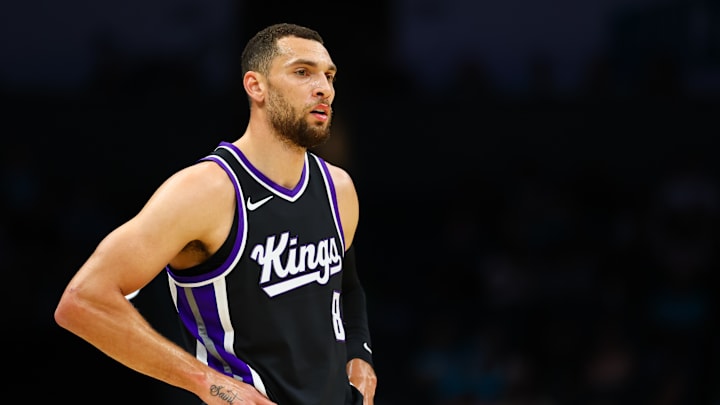Trading your star player is never easy. Just ask the Dallas Mavericks. Actually, why bother? That trade was destined for failure from its inception. The Mavericks record is 12-18 since trading their All-World superstar, while the Los Angeles Lakers, the recipient of Doncic, are 20-12 since acquiring their point guard of the present and future.
Instead, the focus will be shifted to the Chicago Bulls, who notoriously traded Zach LaVine to the Sacramento Kings in a three-team swap, also including the San Antonio Spurs, in exchange for Zach Collins, Tre Jones, Kevin Huerter, and a 2025 first-round pick. Acquiring a first-round pick is always a win. However, that first-rounder was Chicago's to begin with—a top-10 protected pick, sent to San Antonio for DeMar DeRozan in August 2021.
Yikes, dumping LaVine, who averaged 24.0 points, 4.8 rebounds, 4.5 assists, and 3.2 three-pointers per game, for a bevy of underperforming role players and a first-round pick that might not have even been conveyed to the Spurs if Chicago remained in the top 10 of the 2025 NBA Draft was uninspiring, to say the least.
Sure, the Bulls desperately had to part with LaVine and the $138 million remaining on his contract. Chicago had been stuck in purgatory for years, thus a change was mandatory. Nonetheless, the return was less than favorable. The New York Knicks sent five unprotected first-round picks to acquire zero-time All-Star Mikal Bridges just seven months earlier. That comparison is a bit "apples to oranges," but it goes to show the lack of value Chicago extracted for a sub-30-year-old (at the time) two-time All-Star on pace to crack 64 percent in true shooting percentage.
Yet, as lopsided as it initally appeared, the Bulls have performed much better sans LaVine. Chicago was 21-29 when the trade was made. The Bulls' offensive rating was 111.8 and their defensive rating was 115.3, thus their net rating was minus-3.4. Since the trade, Chicago is 15-15, with an offensive rating of 115.2, a defensive rating of 116.1, and a net rating of minus-0.9.
The Bulls and Kings are trending in opposite directions
Okay, so the Bulls minimally improved, so what? It's not expected for a team to trade its best player and get better. The ideology was to enter a rebuild once LaVine was jettisoned. However, that hasn't been the case. The ideology shifted to addition by subtraction. Without the 6-foot-5 swingman in tow, fellow guards Coby White and Josh Giddey enjoyed post-trade deadline breakouts. White won Eastern Conference Player of the Month in March, while Giddey has averaged 19.8 points, 9.2 rebounds, 8.0 assists, and 2.0 three-pointers per game.
Before ravaging the Kings, it must be noted that Sacramento sent arguably its best player, De'Aaron Fox, as part of the three-team deal. Prior to the trade, the Kings were 24-24, with a 1.5 net rating. Since shipping Fox to San Antonio and acquiring LaVine, Sacramento is 15-16 with a minus-0.9 net rating.
The difference isn't drastic for Sacramento either. The Kings' offense has actually improved with LaVine in the lineup. But, as expected, Sacramento's defense has worsened. Aside from a sub-.500 record and porous defense, the Kings' future has suddenly become precarious post-Fox. Sacramento no longer has a prime building block. No disrespect to Domantas Sabonis, but it's never been easy building around a so-so defensive center.
Now, the Kings are stuck with a backcourt consisting of LaVine and DeRozan for at least two more seasons. LaVine will be 32 years old when his contract expires, while DeRozan will be 37. To make matters worse, we already have a pretty good understanding of how the duo has fared alongside one another. The Bulls won, at most, 46 games with the duo. Whenever both players were on the floor together, Chicago went 77-71. The results weren't atrocious, but they certainly were not inspiring—and it'll only get worse from here.
Disregard the fact that the pairing can combine for 80 points on any given night, it's a combination destined to be wholly mediocre. Conversely, the Bulls have improved, and will soon add a lottery pick to an already intriguing core of Giddey, White, and Matas Buzelis. Furthermore, the Bulls are projected to have the fourth most salary cap space in 2025-26, and the most in 2026-27. The future is bright in the Windy City.
